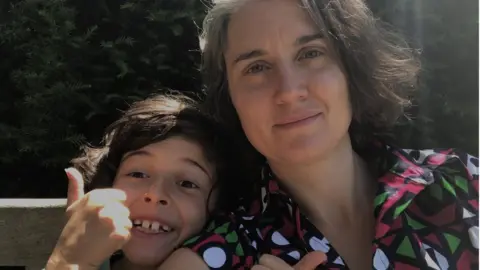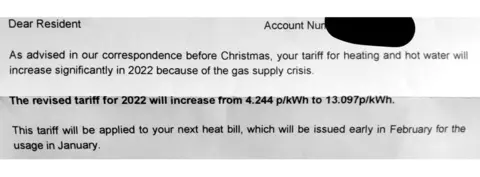Energy bills: 'It's really extraordinarily grim'
 Mary Paterson
Mary Paterson"It's really extraordinarily grim. A normal gas bill for our heating in January would be £150 but this year we've just paid £350."
Mary Paterson is talking about how her gas bill is expected to increase by more than 200% this year.
It is because the home Ms Paterson and her family live in - like all 240 households on her estate in London - are part of a heat network.
All of them get communal heating using just one main boiler and they are not protected by the energy price cap.
Most households will be affected by the rising in the energy price cap which comes into force in April.
Some 18 million homes on standard tariffs will pay an average increase of £693 to £1,971 per year.
About 4.5 million prepayment customers will see an average increase of £708 to £2,017.
But those rises are outstripped by the higher bills customers on heat networks are dealing with. And Ms Paterson only found out her bills were not protected by the price cap in December.
"I'm just not putting the heating on at the moment and it's February", Ms Paterson said.
 Mary Paterson
Mary Paterson"We have one electric heater on in one room. It's fine at half-term because I can take my son out of the house but when my husband and I are working from home I sit with a hot water bottle and blankets on."
She added: "This year we can cut back [to try to afford the bills] but I don't know what we're going to do next year when prices could be just as high or even higher."
What is a heat network?
There are an estimated 800,000 households across the UK in a similar position to Ms Paterson.
Most live on estates or in blocks of flats where management companies, housing associations or local authorities are responsible for the communal heating systems - or heat networks - used.
These companies or associations buy their gas on the open market which means the price increases are not capped and are much more exposed to what regulator Ofgem has described as "a once in a 30-year event with volatile gas prices affecting everyone around the world".
Stephen Knight, director of the Heat Trust, a consumer protection scheme, said: "[The rise in bills] is because of what's happened to wholesale gas prices... and that is really hitting people on these communal heating systems at the moment.
"We've seen examples of where residents have been told their prices were going to go up by 700%."
Heat networks aren't currently regulated by energy watchdog Ofgem, although the Department for Business, Energy and Industrial Strategy has announced plans to change that.
However, Mr Knight thinks that is probably about three years away.
"Proper regulation under Ofgem is what's needed but it's too far away to protect the consumers affected right now so we do need urgent action from the government," he said.
Outside the price cap?
It's not just people on heat networks who don't get the protection of the price cap. There isn't one in Northern Ireland.
An estimated 1.5m households which use oil to heat their homes, often because of rural or isolated locations, aren't protected by the cap.
Some green energy suppliers are also exempted from it by watchdog Ofgem. You can find out if you're protected by the price cap by clicking here.
The government has announced a £9bn package to try to help people with rising energy costs, with a majority of households likely to get £350 - although most of that money will have to be paid back.
In a statement, the Department for Business, Energy and Industrial Strategy told Money Box: "We recognise that leaseholders and heat network customers are currently only protected by the energy price cap for the gas and electricity they buy directly from an energy supplier, which is why we are giving Ofgem new powers to regulate prices in this sector in the future. "The vast majority of leaseholders will receive £200 off their energy bills from October as part of the £9.1bn Energy Bills Rebate and a further £150 Council Tax rebate."
You can hear more on BBC Radio 4's Money Box programme on Saturday at 12pm on Radio 4 or by listening again here shortly after broadcast.
